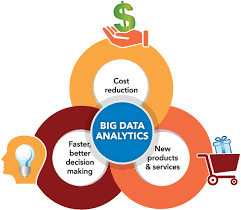The Role of Big Data in Shaping Business Strategies
In today’s digital age, businesses are generating vast amounts of data at an unprecedented rate. This deluge of information, commonly referred to as big data, holds immense potential for shaping business strategies and driving growth. By leveraging big data, companies can gain valuable insights, make informed decisions, and create competitive advantages. Let’s explore the role of big data in shaping business strategies and how it is transforming the way companies operate.
Understanding Big Data
Big data refers to the massive volume of structured and unstructured data generated by businesses and consumers alike. This data comes from various sources, including social media, transactional records, sensors, and more. The key characteristics of big data are often described by the three Vs:
- Volume: The sheer amount of data generated and stored.
- Velocity: The speed at which data is generated and processed.
- Variety: The different types of data, such as text, images, videos, and more.
1. Enhancing Decision-Making
Big data provides businesses with a wealth of information that can be analyzed to uncover trends, patterns, and correlations. This analysis enables companies to make more informed and data-driven decisions.
Key Benefits:
- Predictive Analytics: By analyzing historical data, businesses can forecast future trends and behaviors, helping them to anticipate market changes and customer needs.
- Real-Time Insights: Big data analytics allows companies to monitor real-time data, enabling quick decision-making and response to emerging opportunities or challenges.
- Risk Management: Identifying potential risks and anomalies through data analysis helps businesses mitigate risks and make proactive decisions.
2. Personalizing Customer Experiences
Big data allows companies to understand their customers on a deeper level by analyzing their preferences, behaviors, and feedback. This understanding enables businesses to tailor their products, services, and marketing efforts to individual customer needs.
Key Benefits:
- Targeted Marketing: Analyzing customer data helps businesses create targeted marketing campaigns that resonate with specific audience segments, improving engagement and conversion rates.
- Customer Segmentation: Big data enables companies to segment their customer base into distinct groups based on various attributes, allowing for personalized and relevant interactions.
- Enhanced Customer Service: By analyzing customer interactions and feedback, businesses can identify pain points and improve their customer service efforts, leading to higher satisfaction and loyalty.
3. Optimizing Operations
Big data analytics can streamline business operations, improve efficiency, and reduce costs by identifying inefficiencies and optimizing processes.
Key Benefits:
- Supply Chain Management: Analyzing supply chain data helps businesses optimize inventory levels, reduce lead times, and improve logistics, leading to cost savings and better customer service.
- Process Improvement: Identifying bottlenecks and inefficiencies through data analysis allows companies to refine their processes and improve overall productivity.
- Resource Allocation: Big data helps businesses allocate resources more effectively by identifying areas of high demand and optimizing workforce deployment.
4. Driving Innovation
Big data serves as a catalyst for innovation by uncovering new opportunities and enabling businesses to develop innovative products, services, and business models.
Key Benefits:
- Product Development: Analyzing customer feedback and market trends helps businesses identify gaps and develop products that meet emerging needs and preferences.
- Market Expansion: Big data provides insights into new markets and customer segments, helping businesses expand their reach and explore new growth opportunities.
- Competitive Advantage: Leveraging big data for innovation allows businesses to stay ahead of competitors by offering unique and differentiated products and services.
5. Improving Financial Performance
By providing insights into various aspects of the business, big data can significantly impact a company’s financial performance.
Key Benefits:
- Revenue Growth: Analyzing sales data and customer behavior helps businesses identify revenue opportunities and develop strategies to maximize profitability.
- Cost Reduction: Identifying cost-saving opportunities through data analysis enables businesses to reduce operational expenses and improve their bottom line.
- Financial Planning: Big data analytics supports more accurate financial forecasting and budgeting, helping businesses make informed financial decisions.
Challenges and Considerations
While the benefits of big data are substantial, businesses must also address several challenges to effectively leverage its potential:
- Data Privacy and Security: Ensuring the privacy and security of sensitive data is paramount. Businesses must implement robust measures to protect data from breaches and comply with data protection regulations.
- Data Quality: The accuracy and reliability of data are critical for meaningful analysis. Businesses must ensure data quality by addressing issues such as data duplication, inconsistency, and incompleteness.
- Skilled Workforce: Analyzing big data requires specialized skills and expertise. Businesses must invest in training and hiring skilled data scientists and analysts.
- Technology Infrastructure: Effective big data analytics requires advanced technology infrastructure, including data storage, processing, and analysis tools. Businesses must invest in the right technologies to support their big data initiatives.
Conclusion
Big data is playing a pivotal role in shaping business strategies across industries. By harnessing the power of big data, businesses can enhance decision-making, personalize customer experiences, optimize operations, drive innovation, and improve financial performance. As data continues to grow in volume and complexity, companies that effectively leverage big data analytics will be well-positioned to thrive in an increasingly competitive and data-driven world.
Embracing big data is not just a technological advancement but a strategic imperative for businesses aiming to stay ahead of the curve. By addressing the challenges and investing in the right skills and technologies, businesses can unlock the full potential of big data and achieve sustainable growth and success.

